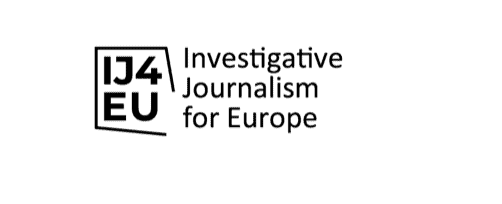How can Our Lady of Fatima holy cards distributed in Poland add up to hundreds of thousands of euros that have been invested in a radically conservative organization in Lithuania? Our cross-border investigation reveals the financial workings of an ultra-conservative network that is silently influencing societies in Central Europe.
1.
A large banner depicting a map of Lithuania flutters in the wind at the Washington March for Life in January 2018. The banner, representing a Lithuanian organization funded by Polish money, was printed by an American entity. It is like the other banners on display here, such as ones that declare “Abortion is a slap in the face of a loving Creator” or “The Netherlands say NO to abortion!”. The latter was printed on behalf of a Dutch organization financed by Polish money and controlled by its Brazilian founders.
Sounds confusing?
It is.
The stories of how these banners came to be perfectly mirror the complex operations of the Tradition, Family and Property (TFP) movement, which pushes an ultra-conservative agenda around the world. In the first part of our story we described TFP’s Latin American roots and its assets in France. We also revealed how Brazilian and French entities were supported by donations sent by the Polish Instytut Piotra Skargi Foundation, based in Krakow.
Today, the main battleground for this ultra-Catholic movement is Central and Eastern Europe. The influence of those seeking to turn Europe back to medieval values, rife with rituals and emblems (such as the golden lion), has been steadily increasing. They fight to condemn same-sex unions, divorce, extramarital relationships, and abortion rights.
Through Krakow, Poland, a network of organizations in Central Europe has been established and fueled with hundreds of thousands of euros in individual donations. Following the launch of ultra conservative entities in Lithuania, Estonia, Slovakia, Croatia, and Hungary, the Polish group has implemented its fundraising model in these countries.
The Instytut Piotra Skargi Foundation was established in 2001 in Krakow to spread the Christian faith and to defend “traditional” values, aligned with TFP principles. We described in detail its origins, influence, and assets in Poland in our second story in this series. The Foundation was established by Caio Xavier de Silveira, a Brazilian living in France, and Matthias von Gersdorff, a Chilean living in Germany, who both still sit on the Foundation’s supervisory board. The Foundation emerged two years after the launch of the Piotr Skarga Association for Christian Culture. The Foundation and the Association, which have similar names – a constant source of confusion for journalists and readers – are two branches of the same group.
From the beginning, both organizations have been managed by three university friends from Krakow – Sławomir Olejniczak, Sławomir Skiba, and Arkadiusz Stelmach. The founders from Brazil provided start-up funds and shared know-how on how to effectively conduct mail-order campaigns and collect money from the Catholic community in Poland.
This model quickly became successful.
2.
“You can’t save the world if you can’t pay the rent.” “The most powerful force in politics is moral indignation.” Sławomir Olejniczak referred in his brochure to these “principles of socio-political rules,” formulated by Morton Blackwell. Speaking at the conferences at the Leadership Institute in 2010 and 2014, Olejniczak shared his experience in fundraising.
TFP leaders have inspired, as well as been inspired by, the methods of American conservatives. Morton Blackwell, a prominent Republican politician founded the Leadership Institute, which “provides training in campaigns, fundraising, youth politics, and communications.” The organization has trained more than 220,000 conservatives in the USA and around the world. Interestingly, according to the official TT account, the Institute’s international activities began “in November 1999, with the Poland Campaign Conference” (i.e., four months after the first Skarga organization was established).
.@LIIntl started in November 1999, with the Poland Campaign Conference. Since then they have expanded their trainings to more than 40 a year.
Below is a photo of attendees from the 2019 International School of Fundraising in Rome, Italy. #ISF2019 #12DaysofLI #12DaysofChristmas pic.twitter.com/BJuS5NcMCn
— Leadership Institute (@LeadershipInst) January 1, 2020
Blackwell is well connected with the leaders of the American TFP at the Foundation for a Christian Civilization (which later printed the foreign banners for the Marches for Life), as well as with the Brazilian founders of the TFP. According to Benjamin Arthur Cowan from the University of California San Diego, “Blackwell even became something of an operator in the Brazilian TFP’s campaign to expand across the world.” TFP leaders, including Caio da Silveira, Mathias von Gersdorf, and Jose Ureta, have given lectures and shared their experience at the Leadership Institute.
The “business model,” which a group from Krakow has adopted and developed, is built on sending cheap medallions, holy cards depicting Our Lady of Fatima and saints, books, and rosaries to hundreds of thousands of people to solicit donations. Simultaneously, the same group operates media outlets (the bimonthly Polonia Christiana and the website PCH24.pl) and funds massive outdoor campaigns, such as a recent campaign against the Holy Communion in hand in Poland.
The success of direct mail lies primarily in the scale of the operation. Over the years, packets sent by the Skarga Foundation have reached millions of households across Poland. In 2018 alone, the Foundation sent out over 1 million door drop flyers and hundreds of thousands of envelopes containing calendars, medals and brochures. Its annual income reached 8.4 millions euros.
Based on domestic success, the Foundation has implemented this model and begun pushing its ultraconservative agenda beyond Poland. Until a split over money and property in 2019, the Krakow-based group co-founded a network of satellite organizations in Central Europe and fueled them with hundreds of thousands of euros. According to the files that we analyzed, by 2017 there was a network of 40 organizations financially supported by Skarga Foundation. Almost half of them are located in Central and Eastern European countries.
We will take a closer look at the TFP network that has grown in Lithuania, Estonia, Slovakia, Hungary, and Croatia.
3.
On November 11, 2020, Šarūnas Pusčius walked up to a statue of Vytis, the Lithuanian coat of arms, in Kaunas. He began his speech by uttering support for the Polish Independence Day March, an annual event held by Polish nationalists and a violent show of power for the far right.
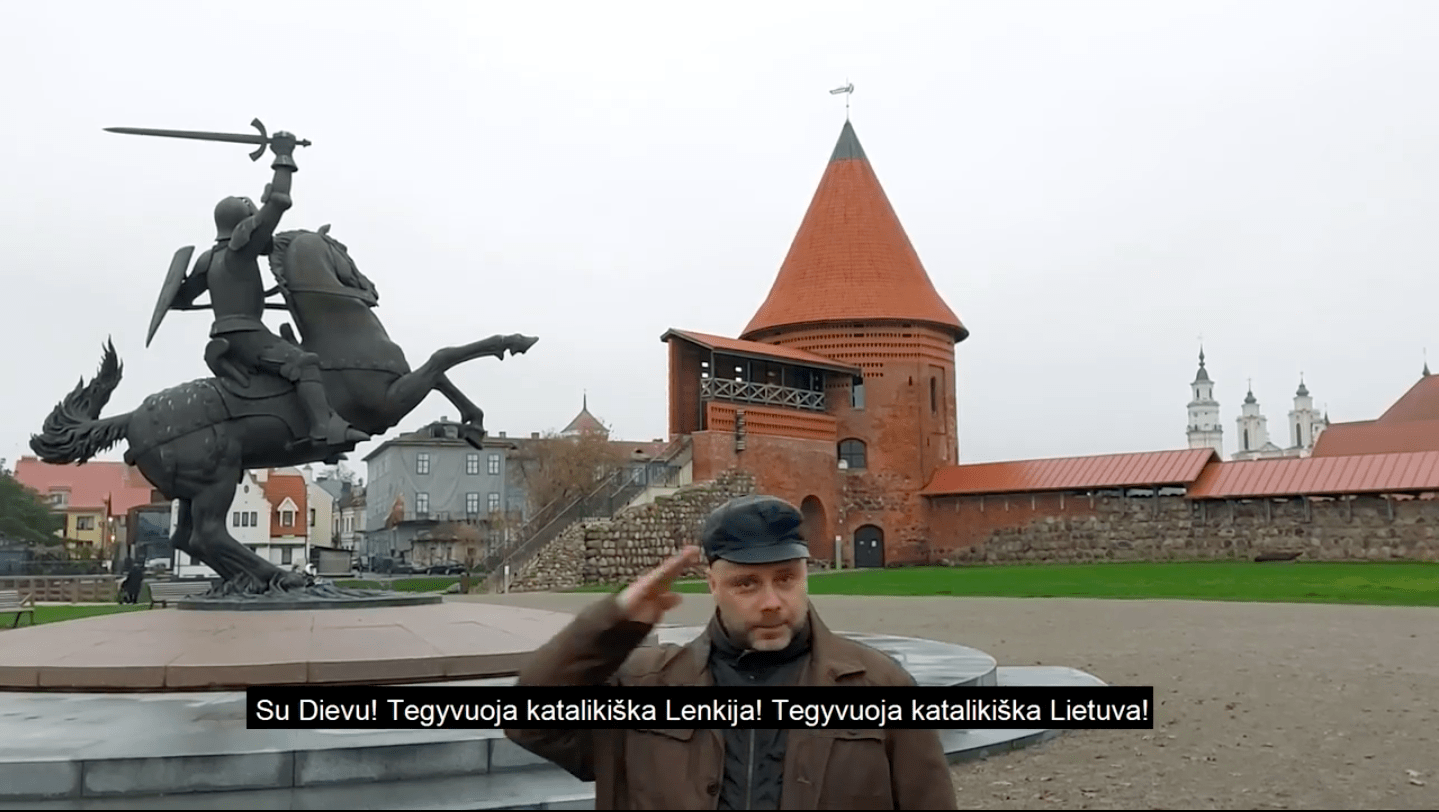
Šarūnas Pusčius supporting the Polish Independence Day March. Source: https://www.facebook.com/watch/?v=2871993153049096
“We congratulate you and we want to say that your fight, the fight for Catholic civilization, against barbarians, against liberal-communists who ravage your churches and want to murder unborn children… your fight, when you collected more than 200,000 signatures against gay parades in Poland, is an encouragement to all Catholic nations,” he said in intermediate Polish.
Calling for a “Catholic counter-revolution” to start in Poland, Pusčius introduced himself as the public relations manager of the Institute of Christian Culture (Krikščioniškosios Kultūros Institutas, KKI), a Lithuanian NGO established and controlled by the Skarga organizations from Krakow, Poland. Over three years, the two Skarga organizations (the Foundation and the Association) invested more than 280,000 euros in expansion in Lithuania. This investment funded a radical-right platform against the LGBTQ community and was a significant source of income for at least two power players from the TFP.
The definition of “Christian culture” presented on KKI’s Facebook page goes well beyond commonly held notions. Along with repeated claims of “liberal-communist barbarians” trying to take over Poland, KKI spreads conspiracy theories about COVID-19, calls for a ban on “homopropaganda,” and even found a moment to announce a crusade against “satanist” celebrations of Halloween.
Founded in 2003, KKI did not have a notable public presence until 2018, when it sided with several far-right organizations to call for a protest against Lithuania’s national broadcasting company, which had recently come under new management.
A small crowd of protesters gathered in front of TV headquarters, accusing it of globalist propaganda. Pro Patria, a Lithuanian far-right organization, organized the event together with KKI.
In 2017, KKI’s personnel grew from 3 to 7 people. The four newly hired “managers” were all tied to Pro Patria. People backed by KKI have tried to enter politics, but with limited success. One of the four “managers” hired in 2017, Martynas Katelynas, was elected to the Varėna municipal council in 2019.
In 2018, the two Polish organizations provided KKI with 115,000 euros. In 2019, this figure jumped to 137,000 euros.
KKI reports having spent more than 91,000 euros on salaries in 2019 – five times more than in 2017. Some of that money, based on employment contracts, went to two Brazilian players from TFP. Renato William Murta de Vasconcelos was employed as an “HR advisor” and Jorge Vicente Saidl was hired as a “PR advisor.” The exact salaries paid to these two Brazilians are unknown.
KKI director Karolis Stankevičius has confirmed that both de Vasconcelos and Saidl are TFP affiliates. When asked what kind of HR advising de Vasconcelos provides, Stankevicius answered, “He is an experienced man; he’s older, while we are all young. He helps solve problems.”
De Vasconcelos was KKI’s director between 2006 and 2018, while Saidl ran its mother organization Krikščioniškosios Kultūros Gynimo Asociacija (KKGA), the Association for Defense of Christian Culture (established on the joint initiative of the Skarga Association and a TFP-satellite organization from Austria). Recall that it was this organization whose banners were present at the Marches for Life in the United States. The association was liquidated in 2019, but prior to that, KKGA transferred its principal asset – control of KKI – to the Skarga Association. Since then, the Lithuanian organization has been controlled by Slawomir Olejniczak’s flank of the TFP network.
KKI’s financial reports reveal that while the two Skarga organizations remain the principal source of income, donations from private individuals have increased dramatically. In 2017, KKI’s income from private donations was insignificant. In 2018, it was already above 15,000 euros, and 2019 marked a record high of 58,000 euros. KKI’s financial reports do not disclose the nature of the donations. However, the organization has copied the modus operandi of the Skarga network. KKI states it “gifted” 5,000 Fatima rosaries and distributed 18,000 “366 days with Mary” calendars through 2019. The organization also distributed 18,000 brochures titled “Why Homosexual Unions Aren’t Marriage,” including 900 copies to unspecified Lithuanian schools. Karols Stankevičius, the head of the KKI confirms that his institution uses the same model of fundraising as the Skarga organizations: “We’re working to increase our numbers, but at present we have 18,000 [donors].”
Stankevičius has confirmed that all of the products distributed to KKI’s donors are made in Poland. He also admits that KKI received professional fundraising training from the Skarga network.
4.
Vilnius is situated nearly halfway between Krakow and Tallinn. Like Lithuanian KKI members, Varro Vooglaid and Markus Järvi also went to Krakow to receive fundraising training in 2012. A few months earlier, they had founded the Estonian Foundation for the Protection of Family and Tradition (SAPTK). They learned from the Skarga Foundation how to get individual donations.
Devout catholics, Vooglaid, a lawyer by profession, and Järvi, a Rome-educated theologian, established SAPTK in 2011 to fight against the ratification of the Registered Partnership Act, which regulates same-sex cohabitation. The idea of SAPTK was proposed to them by TFP-affiliated individuals, including Valdis Grinsteins, a Venezuelan with Latvian roots living in Poland, a long-term TFP activist, and a member of the audit committee of the Skarga Association, and possibly also Olejniczak. The latter became a member of the SAPTK council “to better protect it from domestic attacks,” together with Paul Herzog von Oldenburg, a German duke and a representative of the Federation Pro Europa Christiana from France (today both Olejniczak and von Oldenburg are no longer formally affiliated with SAPTK).
In May 2013 Olejniczak as a SAPTK representative commented on the Estonian organization’s first successful campaign, which managed to collect 38,000 signatures against the draft law on same-sex marriage. “The petition campaign was the largest and most successful collection of signatures ever carried out in the country of 580,000 households against a proposed change of law,” he claimed.
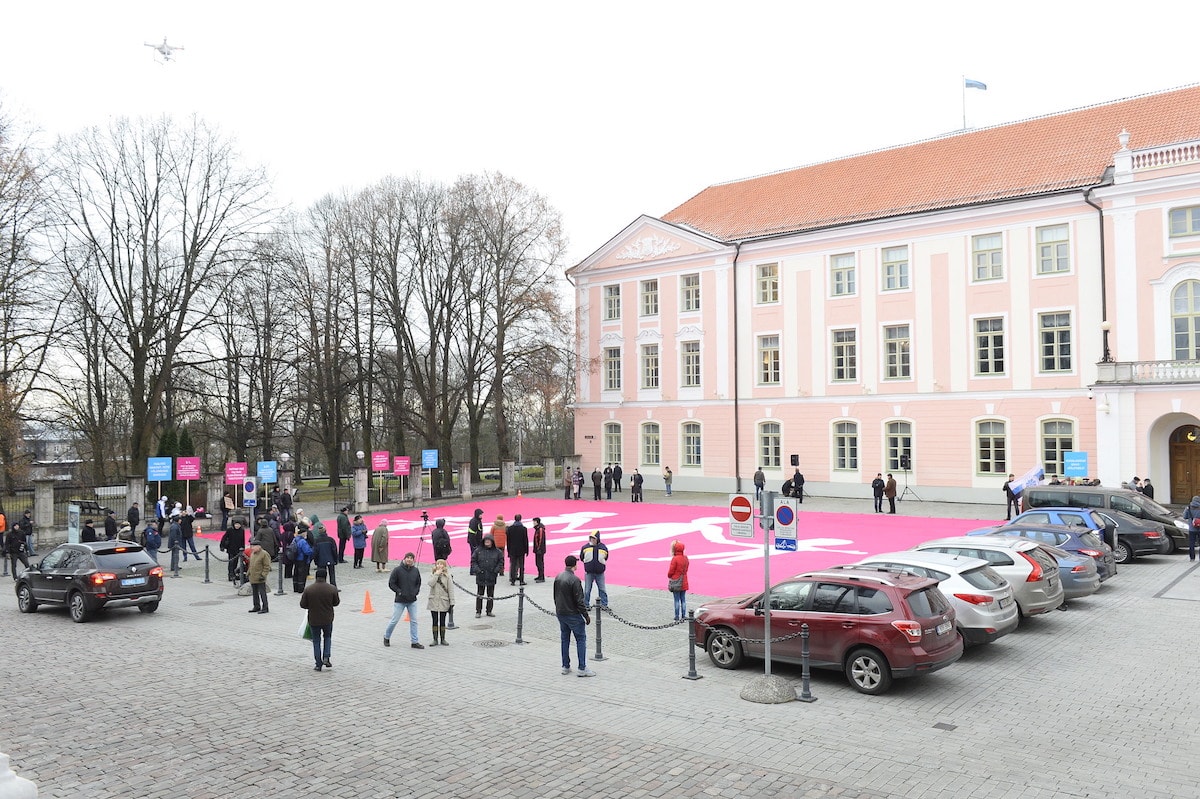
SAPTK protest meeting against cohabitation law in front of Estonian parliament building, Tallinn. Source: Rauno Volmar/Ekspress Meedia
The Skarga Foundation sent money to the Estonian organization three times: 40,500 euros in 2012 to establish SAPTK; 105,779 euros in 2013 for campaigns and publishing; and 13,000 euros in 2016.
SAPTK has done very well with fundraising thanks to the training it received. The organization prides itself on being one of the most independent in Estonia, thanks to its donors. Surprisingly, it collects donation amounts comparable to the largest political parties. Twice a year, thousands of donors pay small sums, which add up to 400,000 euros in annual income. Who are these donors? According to SAPTK representatives, most of the donors are “regular working-class people, although [there are] some businesses and wealthier supporters, too.” But, we have no details and no names.
Over the years, SAPTK has fought against abortion, strip clubs, the acceptance of foreign gay marriages, and several laws regarding marriage. It runs a website, objektiiv.ee, which pushes a strong traditional agenda, and surprisingly supports the Hungarian and the Polish governments.
The leaders of the Estonian organization are planning to expand in 2021; they are looking not only to purchase a building, but also to build a new media studio and launch Conservative Academies for young men.
First, however, SAPTK plans to establish an Estonian branch of Ordo Iuris for lobbying and strategic litigation. Not surprisingly, this plan was inspired by the success of the Polish Ordo Iuris (which was also co-founded by the Skarga Foundation – read more in our story) and its latest campaign against abortion rights, which might have influenced the Polish Constitutional Court to recently ban abortions almost entirely.
The timeframe for launching this new branch was carefully chosen: in the spring of 2021, there will be a referendum on an amendment to the Estonian constitution concerning marriage. Conservative activists strongly advocate for including a definition of marriage as being a bond between a man and a woman in the constitution. They believe that they will repeat Ordo Iuris’s achievement in Poland.
5.
Just a few days before Christmas, in Slovakia, another of Poland’s neighbors, a spokesman for the Slovak Bishops Conference (the most important body of Catholic church) made an unexpected announcement. Warning of misleading information published on eight websites, he strongly recommended “that people be careful when reading websites and consider which information is worth sharing.” One of the websites he mentioned is christianitas.sk run by the Slovakia Christiana Foundation.
“There are numerous hoaxes about church topics,” explains Imrich Gazda, an analyst specializing on the Church in Slovakia. “During the first wave of the pandemic these websites opposed the bishops’ decision to receive communion in hand. Then they spread hoaxes about Covid vaccination,” Gazda adds.
Slovakia Christiana, the publisher of christianitas.sk, is a branch of the Skarga Foundation. This Slovak organization was founded in August 2016, and as stated on its website, is “inspired by the international TFP movement protecting the traditions of Christian civilization” and “defends the unchanging teachings of the Holy Church and the natural understanding of marriage and the family.”
The head of Slovakia Christiana, Martin Komár, threatened us with a lawsuit when the Jan Kuciak Investigative Center (ICJK) asked why the foundation supported Ordo Iuris’s opinion on abortion sent the Polish Constitutional Tribunal. When we got in touch with him a few weeks later to ask about the tens of thousands of euros Slovakia Christiana received from Poland and the private donations that had been flowing into the foundation since its launch, he suggested that we contact the former head of the organization or the Skarga Foundation, saying he had been chairing the organization for too short a time to know (since July 2020).
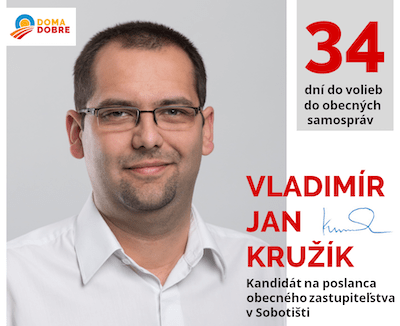
Former general manager of Slovakia Christian Kružík elections advertisement for the elections to village council of Sobotište. Source: www.doma-dobre.sk
The former general manager of Slovakia Christiana, Vladimír Kružík, has confirmed its ties with the international TFP movement. Kružík is well known in Slovak conservative circles for his unsuccessful attempts to be elected as a candidate of the Christian Democratic Party (KDS). A Czech citizen, Kružík is a member of the local council in the Slovak village of Sobotište.
Not widely known until 2018, the Slovak organization first appeared in the spotlight when it organized a petition against the “march of the devils,” known as Krampus, in the town of Piešťany. This tradition originated in the Austrian Alps, and in 2017, 10,000 people took part in the Slovak parade. A year later, more than 13,000 people signed Slovakia Christiana’s petition against the event.
Despite its limited influence, Slovakia Christiana became extremely successful in fundraising. In 2019, it spent almost 650,000 euros on its activities. That was three years after it was founded with a donation of 11,000 euros by the Skargi Foundation (the Polish organization also provided the basic capital of 7,000 euros). In 2017, the Polish organization sent 40,000 euros and books worth 77,000 euros to its Slovak branch. At that time, Slovakia Christiana managed to collect almost 330,000 euros in individual donations. A year later, this amount grew to more than 695,000 euros.
“Thanks to the fact that we have had successful fundraising — many small donations of 2, 5, 10 euros, from a large number of supporters — it actually worked,” commented Kružík on the organization’s income.
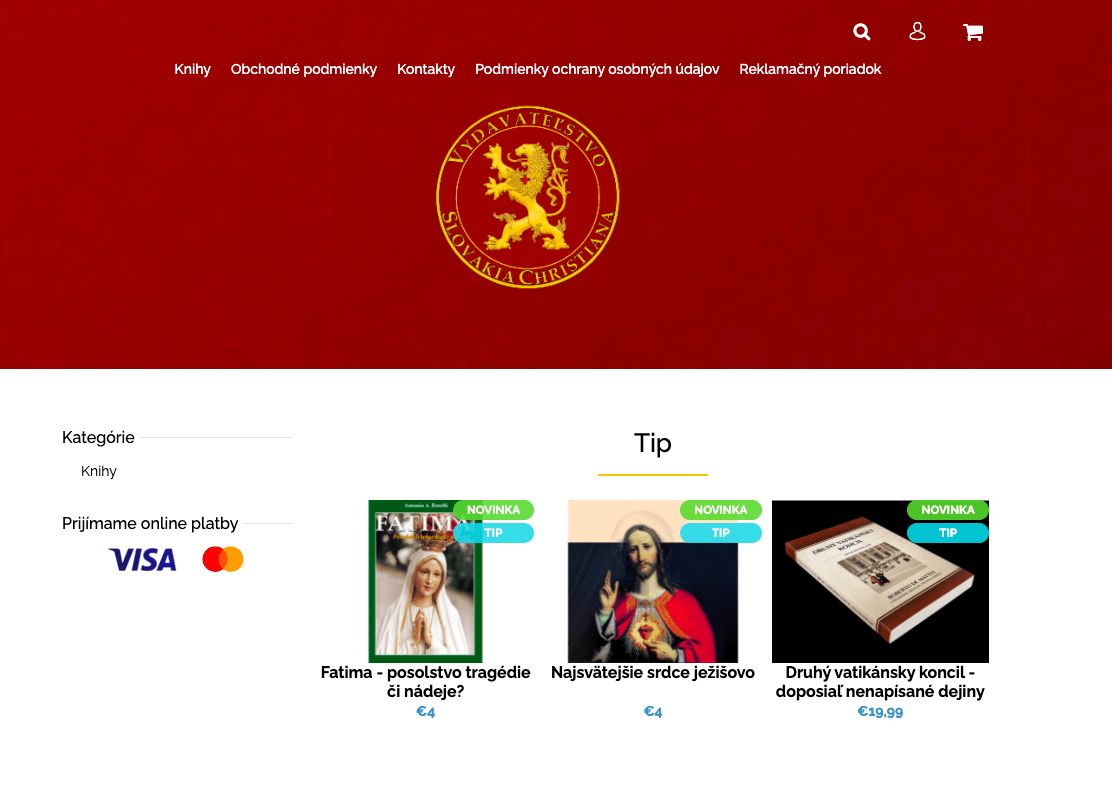
Slovakia Christiana’s shop. Source: Christianashop.sk
In 2019 Slovakia Christiana established a subsidiary publishing house, which opened a new e-shop a few weeks ago. The shop offers a book titled Defending Higher Law (no author is given), describing it with the following words: “The substantial cause of the impressive victories achieved by the homosexual movement does not lie in its strength, but in our weakness. This weakness is the result of a gradual, decade-long effort to blur the line between good and evil.”
Apart from books, Slovakia Christiana’s shop also sells a “Mother of God” medallion, which has been also used by the foundation for voluntary fundraising.
The model created by the Skarga group has proven to be successful in Slovakia.
6.
This model, however, hasn’t worked so well in Budapest, just a two-hour drive from Bratislava.
The Hungarian TFP (the Hungarian Foundation for Christian Civilization) was established by the Skarga Association in 2015, a few months after several members of a Hungarian monarchist group were invited to the 2014 TFP summer school in Poland. The Skarga Association provided an initial capital investment of 10,000 euros, and Olejniczak, together with Stelmach, joined the supervisory board.
“The Polish gentlemen had an exact concept for the foundation,” explains over the phone the organization’s leader, Balázs D. Fekete, a history teacher at a Catholic high school, an anti-abortion activist, and an adamant supporter of reinstating monarchical rule in Hungary.
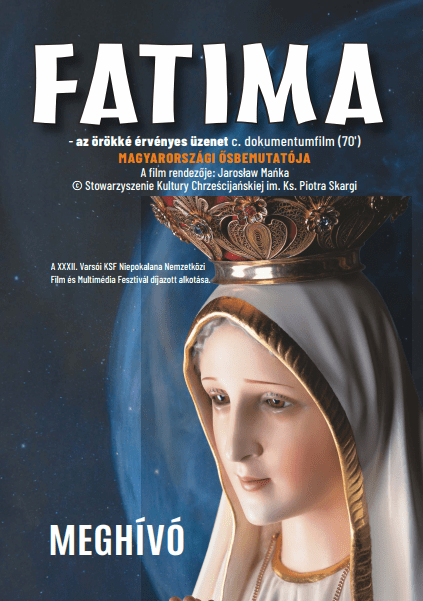
Invitation to the cancelled Fatima screening in Budapest in 2020. Source: vaciegyhazmegye.hu
In 2016, the Hungarian foundation co-organized an anti-abortion rally in front of the Polish embassy in Budapest, where “security” was provided by the militant far-right organization Betyársereg. It also put on a lecture by José Antonio Ureta titled “The Crisis of Western Civilization and the Catholic Resolution.” The lecture addressed the thesis of Alexandr Dugin, a Kremlin ideologue.
The COVID-19 pandemic has postponed several events planned by the Hungarian foundation for 2020, including countrywide screenings of a film about Our Lady of Fatima. The first screening was to be held in October 2020, during the annual Polish Cultural Days in Budapest, financed by the Polish government and also supported by the Skarga Foundation.
In 2020, the Pannonia Christiana website was launched (registered by the Skarga Association). It asks visitors to make donations to the Hungarian foundation, providing its bank account information for that purpose.
Unlike the other members of the network, the Hungarian organization never managed to collect significant amounts of money from donations. According to Fekete, there are too many direct competitors in Hungary, where Prime Minister Viktor Orbán’s government and his party, Fidesz, have embraced ultra-conservatism.
As we found out from the documents, members of the Hungarian TFP discussed their planned activities at a meeting in 2017. Besides renting a new office, they also wanted to maintain “weekly contact with the Polish TFP and regular formation meetings with TFP visitors together for Hungarian, Slovak, and Croatian groups.”
7.
Now, let’s move to Zagreb, the capital city of Croatia.
On the eve of October 13, 2020, a strange procession bearing a cross and statue of Our Lady Fatima passed through the center of the city. A few dozen prayers led by conservative activist John Vice Batarelo were being said at St. Mark’s Square, where government buildings and the parliament are situated, to pray “for the sins of the leaders of the people.”
Gospa Fatimska je sinoć stigla na trgu Sv. Marka, izmoljeno je žalosno otajstvo krunice, te je svećenik blagoslovio…
Posted by Vice John Batarelo on Wednesday, October 14, 2020
Batarelo, an Australian from a Croatian diaspora family, is a leader of Vigilare, a well-known organization in Croatia that fights against LGBTQ rights and abortion, and promotes conservative values. Less known to the Croatian public is the fact that there are actually two organizations with this name: the Vigilare NGO and the Vigilare Foundation. The latter was established in 2016 by the Skarga Association, which invested 5,400 euros and placed its people (including Olejniczak and Grinsteins, who already supervised the Estonian SAPTK) on the supervisory board, and by the Vigilare NGO, a non-profit organization established five years earlier (which invested 100 euros).
Although Vigilare has not been very present in the public eye for the past two years, its income remains high, and so does its influence. According to financial reports, from 2016 to 2019 the organization’s income was more than 2,646,202 euros total, mostly in donations from individuals (annual income grew from 293,894 euros in 2016 to 761,170 euros in 2019).
The fundraising model is unsurprising. Vigilare sends emails with requests to donate money. It also produces and sells ultra-Catholic books, calendars, medals, and rosaries.
However, with the change of political context and the new, more moderate, right-leaning government, there is less public interest in Vigilare’s activities. In 2019 the organization did not even organize the famous Tradfest, its annual conference where conservative activists from around the world gathered from 2016 to 2018. Among the international speakers at the festival were Olejniczak (2016), Aleksander Stępkowski (former head of Ordo Iuris in Poland, now a judge on the Polish Supreme Court, and an unofficial candidate for a judge position at the European Court of Human Rights), Jerzy Kwaśniewski (2017, 2018), and Tymoteusz Zych (2018).
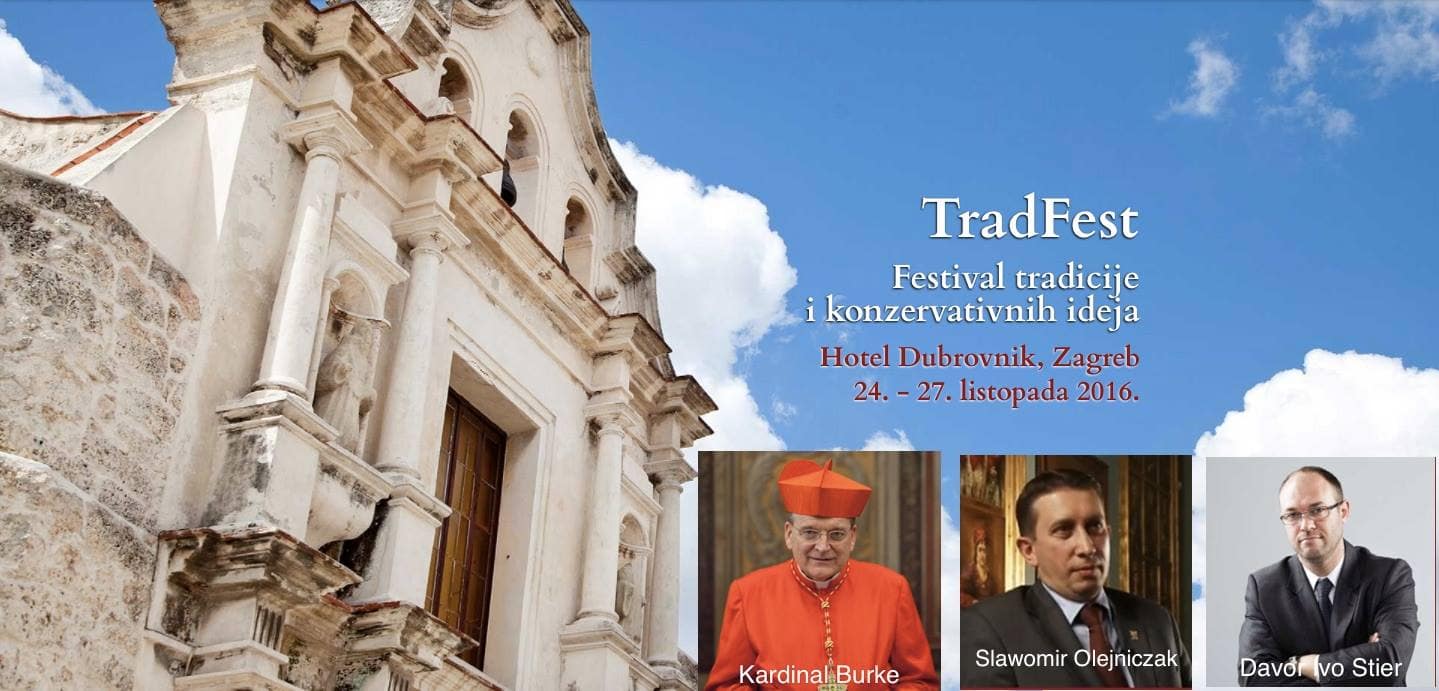
Poster of Tradfest, annual conference where conservative activists from around the world gathered from 2016 to 2018.
Kwaśniewski and Zych are also members of the supervisory board of the Croatian Ordo Iuris foundation, established in May 2019 by the Vigilare Foundation and the Polish Ordo Iuris. Likewise, Olejniczak and Stelmach are members of the supervisory board of the Vigilare Foundation.
Moreover, the Skarga Association donated money to the Vigilare Foundation in 2017 and 2019. We do not know the exact amounts, but according to annual reports, the Croatian organization received 95,041 euros in 2017 and 9,852 euros in 2019 from abroad. Only in the last year, it spent 137,546 euros on “intellectual services.”
We asked the organization about the significant amount of individual donations and the unknown foreign donors, but Vigilare refused to comment. When we called them, they asked us to email our questions. They never responded.
The Croatian foundation has the same logo as the TFP: a lion on a red background and is listed on the American TFP website as a partner organization. The inheritor of Vigilare assets (in case of liquidation) is Stichting Civitas Christiana in the Netherlands (where Caio da Silveira serves as treasurer).

The Croatian foundation has the same logo as the TFP. Vigilare headquarter in Zagreb. Source: Mašenjka Bačić
We already know that Stichting Civitas Christiana banners, printed by the American TFP, have fluttered at Marches for Life in Washington. But there is something more we learn when we read the documents about this Dutch organization in the FARA register: “Besides contributions from and sales to numerous Dutch donors, this foreign principal was funded during the years 2015 through 2017 by grants from Fundacja Instytut Edukacji Społecznej i Religijnej im. Ks. Piotra Skargi.”
Let’s stay for a moment in Washington, where the American TFP (the Foundation for a Christian Civilization) is headquartered. And where Mr. Mario Navarro da Costa, the elderly director of the bureau, is in residence as a “Plinio Corrêa de Oliveira Fellow.” What are his responsibilities?
According to the FARA register, in 2017 he “unsuccessfully attempted to schedule an informal meeting with White House staff on behalf of the foreign principal.” Namely, for Davor Stier, a well-known conservative politician in Croatia, close to Vigilare. “The purpose of the meeting was to strengthen the foreign principal and help establish Croatia as a conservative, pro-family influence in the European Union.”
Surprisingly, at the time Navarro tried to schedule a meeting for him, Stier was not only the minister of foreign affairs, but also the deputy prime minister in Croatia. So why did he try to organize a meeting through a TFP representative?
“I do not know. Really, I do not recall this,” stated Davor Ivo Stier when we called him. He assured us that he did not know the Foundation for a Christian Civilization or the supposed attempt to organize a meeting for him in the White House. The Croatian Ministry of Foreign Affairs replied to our questions that there were no records of such activities.
8.
In late 2019 about a dozen new websites affiliated with the Skarga Association were created in Poland, including koscioldlaciebie.pl, where we read:
‘Our patron, Piotr Skarga, was famous for fiercely fighting heretics and protecting the faith as a leader of the Polish counter-reformation. Just as our organization is often attacked and called fraudsters, which is untrue. Why would such an organization cheat when it doesn’t even make money as a nonprofit? One of the ways to attack us is to accuse us of links with other organizations. What is missed is that all the organizations are independent and financed by other sources.’
How successful in fundraising has the Central and Eastern European network been? According to the financial data we analyzed, in 2019 organizations linked to the Krakow-based Skarga group collected more than 2 million euros in four countries (Lithuania, Estonia, Croatia, and Slovakia). Additionally, the Skarga Association collected 6.3 million euros in donations in Poland.
“The Polish TFP organizations seem to have taken the leadership within the movement as they have expanded the franchise to Croatia, Estonia, the Netherlands, Slovakia and Switzerland. These new TFP organisations have become key actors, at times leaders, in the anti-gender campaigns in Europe,” wrote Neil Datta in his report on “The Modern Crusaders in Europe.”
At the end of May 2019, Olejniczak and the rest of the Skarga Foundation’s board were dismissed by the members of its council (Xavier Caio da Silveira and Matthias von Gersdorf). They were replaced with faithful TFP militants, like Fernando Antunez, a practically lifelong member of the Brazilian TFP and an activist associated with the Plínio Corrêa de Oliveira Institute in São Paulo.

Fernando Antunez Aldunate (center) and Jędrzej Stępkowski (right), prominent members of Piotr Skarga Foundation Institute of Social and Religious Education during a March for Life and Family, 20.09.2020, Warsaw. Photo by Reporters Foundation
This is how the split in the TFP network began. The Krakow group transferred Polish assets (including properties and the donor database) from the Foundation to the Association, which is still under the former board’s control (Olejniczak’s group). Since then, the Association has also taken over supporting its European network. In 2019, the Polish organization sent another 296,425 euros to support satellite organizations, including Krikscioniskosios Kulturos Institutas and the Vigilare Foundation. According to the documents analyzed by Siena.lt, changes in the ownership of the Lithuanian organization also mirrored the conflict between Brazilians from TFP and their former comrades in Poland.
‘We were driven by the desire to save a counter-revolutionary mission in Poland and Eastern Europe from excessive and potentially dangerous financial drainage by Dr. Caio and Mr. Fernando Antunez,’ states Olejniczak, explaining these operations in an email sent to TFP members that we obtained. ‘In Jesu et Maria’, concluded Olejniczak, now in charge of an autonomous, post-TFP network in an increasingly conservative Central Eastern Europe.
[This is the second part of the story. In the first part we revealed how money collected from individual donations in Poland was funneled to organizations linked to the Tradition, Family, and Property movement in France and Brazil]
Report by:
Julia Dauksza, Anna Gielewska, Konrad Szczygieł (Reporters Foundation, Poland)
Sarunas Cerniauskas, Migle Kranceviciute, Liucija Lenkauskaite (Siena.lt, Lithuania)
Lukas Diko, Tomas Madlenak (Investigative Center of Jan Kuciak/ICJK, Slovakia)
Masenjka Bacic (Croatia)
Oliver Kund, Holger Roonemaa (Estonia)
Márton Sarkadi Nagy (Atlatszo, Hungary)
Contributed to the story: Dennis Mijnheer (The Netherlands), Michael Nikbakhsh (Austria)
Read in Polish: onet.pl
The production of this investigation was supported by a grant from the Investigative Journalism for Europe (IJ4EU) fund.







